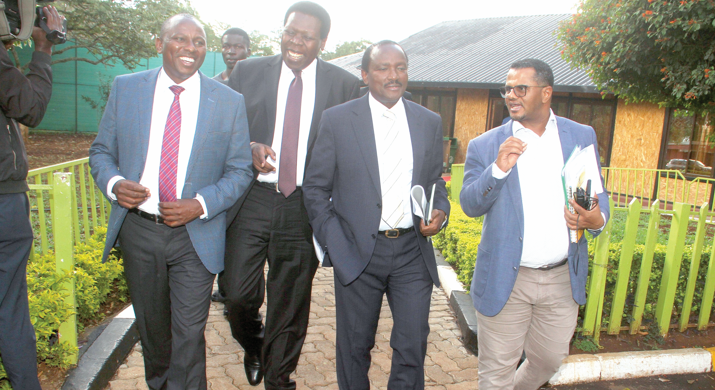Radical proposals as cost of living dominates party talks

Radical proposals seeking to find solutions on how to mitigate the high cost of living dominated the bipartisan talks yesterday following presentations by the Office of the Controller of Budget and top economists.
Economist Kwame Owino of the Institute of Economic Affairs, Arthur Muliro of the Society for International Development and Director of Parliamentary Budget Office Dr Martin Masinde were among those who presented their proposals before the committee co-chaired by Wiper leader Kalonzo Musyoka (Azimio) and National Assembly Leader of Majority Kimani Ichung’wah (Kenya Kwanza).
The Office of the Controller of Budget yesterday made suggestions on how the state can tame the runaway cost of living in the country.
Controller of Budget Dr Margaret Nyakang’o asked the government to review the existing tax structure to ensure it is progressive and does not unduly burden low-income households.
“Consider reducing taxes on essential commodities while exploring avenues to broaden the tax base, such as implementing fair and efficient income taxation, registering households in the informal sector and imposing a tax on their business activities,” said Nyakang’o.
She also called for the implementation of stringent measures to eliminate corruption and ensure proper utilisation of public funds for the benefit of the citizens. She decried lack of transparency and accountability in government operations.
Social welfare programmes
The Controller of Budget also suggests enhancing social welfare programmes to assist vulnerable populations, such as the elderly, disabled, and low-income families.
“The vulnerable in the society can be assisted by increasing allocations to existing programs like cash transfer schemes, subsidized healthcare services and timely payment of pensions and gratuities,” said Nyakang’o.
Her office also encouraged partnerships between the public and private sectors to invest in crucial infrastructure projects implementing strict fiscal discipline measures to ensure prudent use of public funds. She also suggests supporting smallholder farmers by providing access to modern farming technologies, credit facilities, and training programs.
Owino suggested tax reliefs and tax exemptions as one of the ways to reduce the high cost of living. He also suggested tightening of monetary policies and anchoring of all social protections in a statute.
“It is prudent to have an efficient and a fair tax system that promotes equity in tax administration and a predictable tax environment for business to operate,” said Owino.
Sought immediate solutions
Members of the Azimio La Umoja Coalition in the bipartisan talks team stressed the need for the Kenya Kwanza government to offer immediate solutions on lowering the cost of living while their Kenya Kwanza counterparts seemed to defend President William Ruto’s efforts making living affordable to Kenyans.
According to Kalonzo, the Kenya Kwanza government should place its focus on initiatives and economic policies that are geared towards controlling inflation and maintaining price stability.
“The government should employ a mix of monetary and fiscal measures, including interest rate adjustments and tax reforms, to keep rising prices in check,” he said.
Kalonzo also suggested that the government should use monetary and fiscal policies to control inflation and maintain price stability like adjusting interest rates and taxes.
He asked President Ruto’s government to tackle the cost of living head periodically adjusting minimum wage rates in order to ensure that workers receive fair compensation for their labor, in line with the rising costs of living.
“Minimum wage adjustments are designed to establish a baseline income level that allows workers to cover their basic needs, such as housing, food, and healthcare. This is crucial in regions where the cost of living has outpaced wage growth,” said Kalonzo.
According to him, if the Kenya Kwanza government wished to raise the minimum wage, they must aim to reduce income inequality. This policy, he says, can help narrow the wage gap between low-wage workers and those in higher-paying positions, ultimately fostering a more equitable society.
He expounded that adjusting the minimum wage periodically is needed to keep it in step with the rate of inflation. As the general price level rises over time, stagnant minimum wage rates erode the purchasing power of low-income workers.
By adjusting the minimum wage, the government should help these workers maintain their standard of living. Ichung’wah argued that the cost of living varies significantly from one region to another in the country and thus setting a uniform minimum wage may not fully address the unique economic circumstances in different areas.
“Implementing regional minimum wage adjustments can help reduce wage inequality. It can narrow the income gap between regions, creating a fairer economic landscape where workers across different areas have more equal opportunities to improve their quality of life,” he said.










